RYO Review: Blameless by Gail Carriger
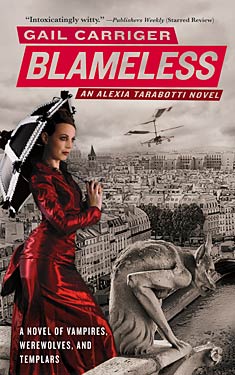
 Gail Carriger‘s The Parasol Protectorate novels are like delicious, ridiculously decorated little petit fours of books. I read Blameless in under twenty-four hours, mostly in two sittings. I went through two cups of lavender Earl Grey tea, one glass of wine, two espressos, and one cup of vanilla black tea while reading it. The espresso is not very Parasol Protectorate-ish, but Alexia was in Italy for that portion of the book.
Gail Carriger‘s The Parasol Protectorate novels are like delicious, ridiculously decorated little petit fours of books. I read Blameless in under twenty-four hours, mostly in two sittings. I went through two cups of lavender Earl Grey tea, one glass of wine, two espressos, and one cup of vanilla black tea while reading it. The espresso is not very Parasol Protectorate-ish, but Alexia was in Italy for that portion of the book.
I was a little afraid going into this book, because the end of the last book was very heavy, and also Conall was absolutely terrible, so I was afraid that in order to provide conflict throughout this book, he would continue to be a jerkface and then I wouldn’t be able to be happy about him and Alexia getting back together (which was basically the inevitable ending). Luckily, things weren’t as bad as I feared on that front, since (a) the book only takes place over a few weeks, and (b) apparently Conall deals with his feelings by getting sloshed off formaldehyde and then the mess he created continues because he can’t sober up for weeks, not because he is continuing to actually have dumber-than-a-brick opinions about the whole mess.
RYO Review: Changeless by Gail Carriger
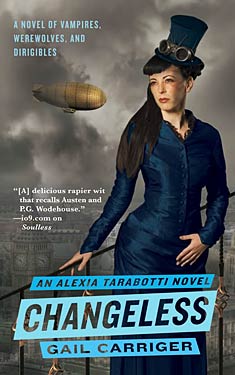
 Snowpocalypse. Again. This one I celebrated by drinking copious amounts of tea and reading Gail Carriger‘s Changeless, the sequel to her delightful absurdist steampunk fantasy mystery romance Soulless, which I read over the summer (in a delightful rustic lakeside cabin in Maine. God, I can’t wait for summer again).
Snowpocalypse. Again. This one I celebrated by drinking copious amounts of tea and reading Gail Carriger‘s Changeless, the sequel to her delightful absurdist steampunk fantasy mystery romance Soulless, which I read over the summer (in a delightful rustic lakeside cabin in Maine. God, I can’t wait for summer again).
In Changeless, our soulless heroine, formerly Alexia Tarabotti, now Mrs. Alexia Maccon, Lady Woolsey, is just settling in to her multiple new roles as a married woman, the female Alpha of Woolsey pack, and Queen Victoria’s muhjah, when chaos strikes, in the form of an entire regiment of werewolves camping out on her front lawn. Well, that happens, but it’s not the real chaos, unfortunately. The real chaos is a peculiarly exactingly defined area of London in which all supernatural have ceased being supernatural, as if a preternatural (a soulless person, like Alexia) were continually touching everyone within a certain radius at once. Needless to say, the vampires and werewolves are rather panicked. The ghosts, unfortunately, have been exorcised, and as such have nothing to say about the matter.
WoGF Review: To Say Nothing of the Dog by Connie Willis
 Clare Fitzgerald (thecynicalromantic) started reading feminist deconstructions of fairy tales in elementary school and grew up to major in literature and something called “discourse studies.” She reads a lot of teen fiction, gothic novels, and retold fairy tales, and is especially interested in feminist issues in fantasy and sci-fi. She reviews books at A Room of One’s Own because otherwise she is liable to forget what she’s read and what she thought about it. She currently works as a technical editor, but aspires to be a vampire witch queen pirate sorceress when she grows up.
Clare Fitzgerald (thecynicalromantic) started reading feminist deconstructions of fairy tales in elementary school and grew up to major in literature and something called “discourse studies.” She reads a lot of teen fiction, gothic novels, and retold fairy tales, and is especially interested in feminist issues in fantasy and sci-fi. She reviews books at A Room of One’s Own because otherwise she is liable to forget what she’s read and what she thought about it. She currently works as a technical editor, but aspires to be a vampire witch queen pirate sorceress when she grows up.
Editor’s Note: This review counts for November.
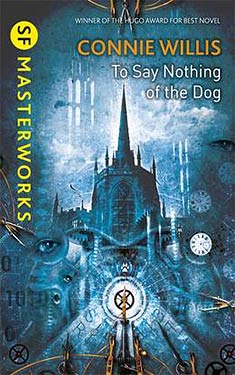 So, recently, in Adventures of Being a Gothy Cliché, I joined a SF/F meetup group specifically to attend their Halloween party. And then I didn’t like any of the other stuff the meetup group was doing. Until I got a message saying that their book for their December book club was going to be Connie Willis‘ To Say Nothing of the Dog, which has been on my TBR list for a while.
So, recently, in Adventures of Being a Gothy Cliché, I joined a SF/F meetup group specifically to attend their Halloween party. And then I didn’t like any of the other stuff the meetup group was doing. Until I got a message saying that their book for their December book club was going to be Connie Willis‘ To Say Nothing of the Dog, which has been on my TBR list for a while.
Things I knew about To Say Nothing of the Dog:
1. Its title is a reference to Jerome K. Jerome’s Three Men in a Boat (To Say Nothing of the Dog…), a book I have not read, but which is supposed to be very funny, and is a travel narrative about… well, exactly what it says on the tin: three men in a boat.
2. Somehow it’s a SF/F book despite being based on a Victorian travel narrative. (I thought it was going to be maybe about three men and a dog on a space boat? So unprepared.)
3. ???????
It turns out, To Say Nothing of the Dog is about TIME TRAVEL, which I would have known if I had read the subtitle of the book, which is “(Oxford Time Travel #2)”. I have not read whatever Oxford Time Travel #1 is, but whatever. It is also about THE VICTORIAN ERA, which is one of my favorite eras. Overall, it is a sci-fi, historical fiction, mystery, comic novel, with a side of romance.
WoGF Review: We Have Always Lived in the Castle by Shirley Jackson
 Clare Fitzgerald (thecynicalromantic) started reading feminist deconstructions of fairy tales in elementary school and grew up to major in literature and something called “discourse studies.” She reads a lot of teen fiction, gothic novels, and retold fairy tales, and is especially interested in feminist issues in fantasy and sci-fi. She reviews books at A Room of One’s Own because otherwise she is liable to forget what she’s read and what she thought about it. She currently works as a technical editor, but aspires to be a vampire witch queen pirate sorceress when she grows up.
Clare Fitzgerald (thecynicalromantic) started reading feminist deconstructions of fairy tales in elementary school and grew up to major in literature and something called “discourse studies.” She reads a lot of teen fiction, gothic novels, and retold fairy tales, and is especially interested in feminist issues in fantasy and sci-fi. She reviews books at A Room of One’s Own because otherwise she is liable to forget what she’s read and what she thought about it. She currently works as a technical editor, but aspires to be a vampire witch queen pirate sorceress when she grows up.
Editor’s Note: This review counts for October.
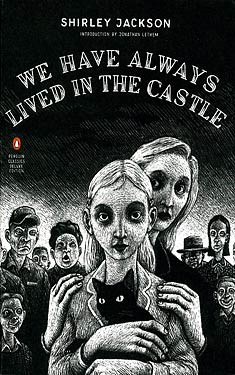 Much like everyone else who has gone through the American school system in the past few decades, I have read Shirley Jackson‘s famously creepy short story, The Lottery. I think The Lottery is one of those pieces that I had to read multiple times at different grade levels; however, I had never read anything else by Shirley Jackson, until now. In honor of it being Halloween, the latest book for my Classics book club was We Have Always Lived in the Castle, a short but exquisitely creepy novel about the last living members of a wealthy family, who live in a big house overlooking a small New England village.
Much like everyone else who has gone through the American school system in the past few decades, I have read Shirley Jackson‘s famously creepy short story, The Lottery. I think The Lottery is one of those pieces that I had to read multiple times at different grade levels; however, I had never read anything else by Shirley Jackson, until now. In honor of it being Halloween, the latest book for my Classics book club was We Have Always Lived in the Castle, a short but exquisitely creepy novel about the last living members of a wealthy family, who live in a big house overlooking a small New England village.
Our narratrix in this novel is Mary Katherine Blackwood, generally known as Merricat, who is eighteen years old. The other two remaining members of her family are her older sister Constance, and her Uncle Julian. Uncle Julian is very sickly, having survived the poisoning that killed the rest of the family six years earlier. We discover, eventually, that Constance and Merricat were the only family members not poisoned, Constance because the poison was in the sugar, which she never used, and Merricat because she had been sent to her room without dinner.
WoGF Review: Range of Ghosts by Elizabeth Bear
 Clare Fitzgerald (thecynicalromantic) started reading feminist deconstructions of fairy tales in elementary school and grew up to major in literature and something called “discourse studies.” She reads a lot of teen fiction, gothic novels, and retold fairy tales, and is especially interested in feminist issues in fantasy and sci-fi. She reviews books at A Room of One’s Own because otherwise she is liable to forget what she’s read and what she thought about it. She currently works as a technical editor, but aspires to be a vampire witch queen pirate sorceress when she grows up.
Clare Fitzgerald (thecynicalromantic) started reading feminist deconstructions of fairy tales in elementary school and grew up to major in literature and something called “discourse studies.” She reads a lot of teen fiction, gothic novels, and retold fairy tales, and is especially interested in feminist issues in fantasy and sci-fi. She reviews books at A Room of One’s Own because otherwise she is liable to forget what she’s read and what she thought about it. She currently works as a technical editor, but aspires to be a vampire witch queen pirate sorceress when she grows up.
Editor’s Note: This review counts for September.
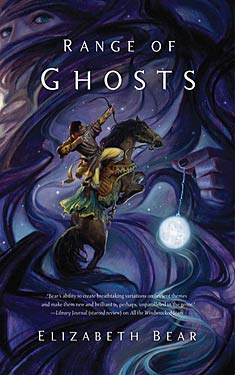 I had the privilege of buying Elizabeth Bear‘s Range of Ghosts directly from the author, along with a few of her other books. She is one of the many awesome people I met at Readercon, so I was happy to pay for shiny signed new physical copies plus shipping rather than buying an ebook, even though I’ve never read any of her other stuff.
I had the privilege of buying Elizabeth Bear‘s Range of Ghosts directly from the author, along with a few of her other books. She is one of the many awesome people I met at Readercon, so I was happy to pay for shiny signed new physical copies plus shipping rather than buying an ebook, even though I’ve never read any of her other stuff.
I do not regret this decision at all.
Range of Ghosts is a political fantasy and it’s based largely on the medieval Middle East and Asia. A major theme is the rise and fall of empires; the empire that owns most of the known world at the time of this story is the Qersnyk Khaganate, which is largely based off the Mongol Empire—the Qersnyk are a culture made up of a number of nomadic horse tribes from the steppe. The Khaganate is facing civil war after the death of the Great Khagan. Other kingdoms, empires, and former empires—some subject to the Khaganate; some on its borders—have their own cultures and their own reactions to the war within the Khaganate. How closely these other kingdoms seem to be based on other Asian and Middle Eastern cultures varies, or possibly my familiarity with the cultures in question does. The different cultures and the different factions within the political houses are all well-characterized and clearly differentiated. As far as I can tell, there are no white people in the entire book.



















 Full Details
Full Details

